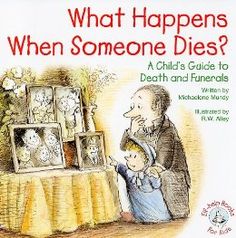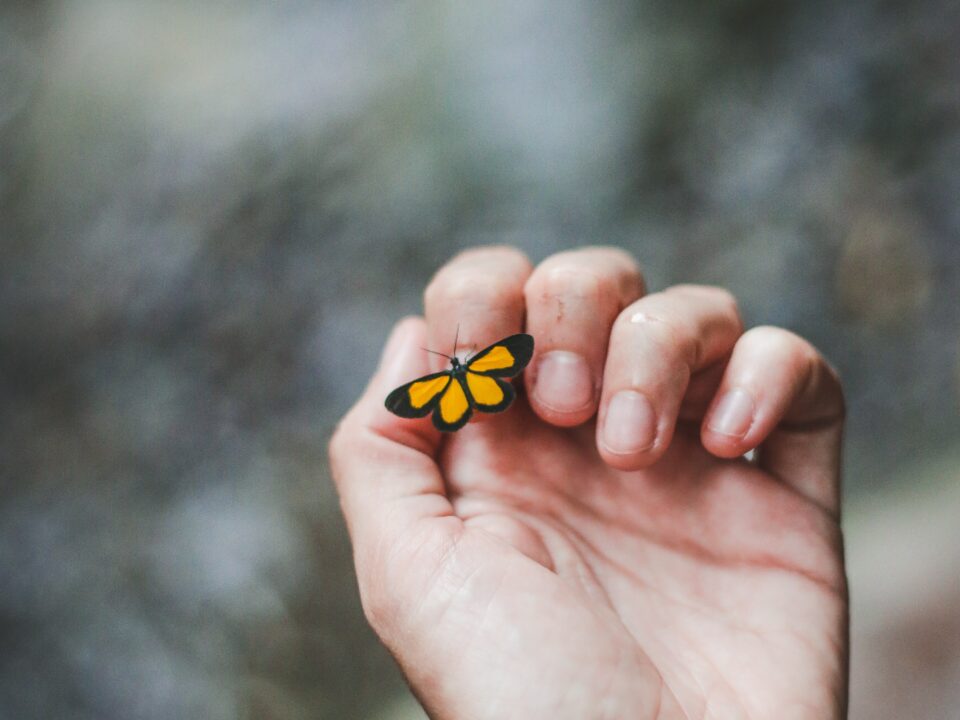What to Tell Children About Funerals
I was recently browsing through the new gift shop at Mission San Juan Capistrano, admiring the jewelry and slowly making my way to my favorite corner of the store; the book section on Grief. I’m always finding new and intriguing titles there and this time, I stumbled upon a series of children’s books on grief that deeply impressed me.
We hear the debate about children being at funerals pretty often around here and while we always encourage people to bring their children, they don’t always agree with us. Well, to my surprise, in the book What Happens When Someone Dies? the question is never even addressed, it is just automatically assumed that children will be there and explains with a delicate, gentle and uncomplicated voice what the child will experience.
Let me give you an example:
Under the question, What should I Say or Do at the Funeral Home? the author writes,
“At the funeral home, people talk about what they remember about the person who died. They talk about nice and sometimes funny times they had with the person. You may hear laughter as they remember happy times.
If you walk up to the casket, take your mom or dad’s hand. We all need each other – especially in sad times. Sometimes the casket is up too high for you to see. Ask someone to help you up.”
I don’t know about you but reading that made me feel better. The explanations are simple but address the hard stuff and don’t shy away from it.
I remember being told when it comes to children to only answer the questions they ask you. You don’t explain the complexities of life and death to your 5 year old when they’ve only asked you why you’re sad. Your answer may lead to more questions and that’s ok, but sometimes children can feel overwhelmed by information that they can’t process or understand. This book is an excellent resource. If you don’t want to read the whole book to them you can still reference this book to help you answer their questions in your own way.
What Happens When Someone Dies? addresses some tough questions like:
- Why do people die?
- Does it hurt to die?
- Are there other ways people say goodbye? (an explanation of cremation)
- What happens at the funeral home?
- What should I say or do at the funeral home?
- Why are some people at the funeral home happy and laughing?
- What should I do at the church funeral service?
- What happens at the cemetery?
- When will everything be ok again?
*These books do have a religious overtones referencing Heaven, God and prayer. I don’t feel they are heavy-hitting but these books may not be appropriate in their entirety for particular faiths.
I continue to be surprised by families who disagree with our funeral arrangers who see day-in and day-out the power of ceremony and how children react and benefit. Our arrangers are experts who can testify endlessly to the power of being included and present at a funeral; but too often a family’s fears and sense of protection keep children from experiencing a ceremony that would actually bring them even greater peace.
 A recent article entitled, “Should Children Attend Funerals?” states that despite public opinion, “child bereavement experts are united in believing that children should be offered the chance to attend funerals, regardless of how young they are.” The article goes on to quote one of these experts, Helen McKinnon, who says, “I’ve never yet come across anyone who regrets going to a funeral as a child. But what we do hear time and time again is those who wish they had gone and in many of those cases, it’s prevented them from starting on their grieving journey.”
A recent article entitled, “Should Children Attend Funerals?” states that despite public opinion, “child bereavement experts are united in believing that children should be offered the chance to attend funerals, regardless of how young they are.” The article goes on to quote one of these experts, Helen McKinnon, who says, “I’ve never yet come across anyone who regrets going to a funeral as a child. But what we do hear time and time again is those who wish they had gone and in many of those cases, it’s prevented them from starting on their grieving journey.”
This same article quotes Christina Brady who had to attend school the same day as her mother’s funeral. She asks the powerful question: “… if adults need a ritual to mark the passing of someone dear to them, doesn’t it follow that children – who are less able than anyone to make sense of the mess of feelings that follow a death – need it even more?”
The answer seems simple: Yes, they do.
There are two messages – this book offers one of understanding, acceptance, and compassion. The other only perpetuates the great fear and avoidance of death our culture has adopted. Let’s give our children the right message.
|| what do you think?
– Where do you stand in this debate and why?
– What answers were you given as a child when you asked about death and how did they help or hinder your understanding?
Other books on tough subjects available in this thoughtful series are:





42 Comments
I agree, children should go to funerals. I think society as a whole does not give them the credit they deserve as far as understanding things. For someone to suddenly be gone, especially someone important to the child, I am sure they need an explanation or they will go on confused for quite some time. I think the visual is definitely beneficial, whether it be viewing or just a memorial service. To see that the life had meaning, enough meaning to celebrate and commemorate with a service and a gathering of people who loved the person, would probably shed some clarity on the situation. I also think that it’s important to convey to the child that this happens to everyone, it is not a bad thing necessarily, even though sometimes it is tragic. I think as a child I had a vague understanding of death, not going to any funerals myself until I was about 12. Before that though, I just knew the person was gone never to return, and I had a fear of funerals. I had heard they were scary and what I thought up in my mind was 100% worse than the truth. Now I wish I had attended some of them. I see a lot of similarities between children and adults in their need to attend services. People at any age are affected greatly by death and need some type of event to signify that the loss has occurred and that life will never be quite the same without that person.
Shasta,
Remembering what your thought of death before you got to see it is so interesting. I’m fascinated about how much it bothered you, it bothered you to the extent that you built and created something around it to help you understand. That is such proof that children think about death, they wonder about it, and if answers aren’t offered or aren’t given then mysteries and wonders, possibly even terrors can arise.
Thank you so much for sharing that with me, such a unique view!
Molly
Molly,
I do believe in all children being able to attend a funeral of a loved one. I think that
children should have a voice. They can always say no I don’t want to go, or no I don’t want to see. But coming from experience if you deny the child the chance, they will always remember that and wonder. And sometimes the wonder can be made up into a greater deal than the actual act of the funeral or viewing. I was told my last image of my father would be that of him lying in the casket. That is untrue, and I was quite relieved when I saw him. I had made the accident out, and the way my father looked out to be a lot worse than the reality. I am thankful for O’Connor and the service and viewing that helped begin my journey of grief.
Erin,
Your voice in this is so beautiful, strong, and valuable. I so appreciate the perspective you bring to the importance of children being present and the power of your experience. Your comment on “wonder” is so interesting to me, it’s continued to come up in this conversation so much. The wondering is worse – it always is, especially for families who have suffered traumatic deaths.
I so appreciate you – thank you for sharing.
Molly
Does it hurt to die? is probably the most poignant question I remember thinking while I was a little guy. I guess as a child, life is so simple that really all we care about is what hurts and what feels good. I remember playing games in school like “would you rather..” with my friends, and I specifically remember one where my friend asked “Would you rather die by drowning, or by burning?” and my immediate response was “Neither. I’m going to live forever.”
So far, so good.
Nice answer! And yes, given those options, living forever sounds favorable. It’s so fascinating the questions that mean something to us – I’d love to hear your answer to it someday.
Molly
Dear Molly, I am so glad you are touching on this topic, it is a hot one! Just this week I had a family ask me if they should have their child there, of course I said yes & explained why. They followed my lead & it turns out that the sweet boy was way ahead of everyone else. He truly knew what we are taught to forget as we grow up- death is natural, we all will die & it’s nothing to fear. He was comforting his family in a way I’ve seen from children before- hugs, kisses, kind & wise words, wiping away tears. It was truly a beautiful moment. Thank you, Molly! Carrie
What a wonderful outcome – I’d never thought about how children end up becoming a source of comfort rather than the ones needing most of the comfort. I’m so glad we have champions like you helping families and their children into these experiences.
Thank you for sharing your awesome insight, Carrie!
Molly
Yes, and alternately, if they don’t want to come I don’t know if we should be forcing that on them – another interesting question!
I’m glad you thought this was a good topic and I’m sure now you see with crystal clarity the great tenderness of topics like these with little children.
Thank you for sharing, Joanna!